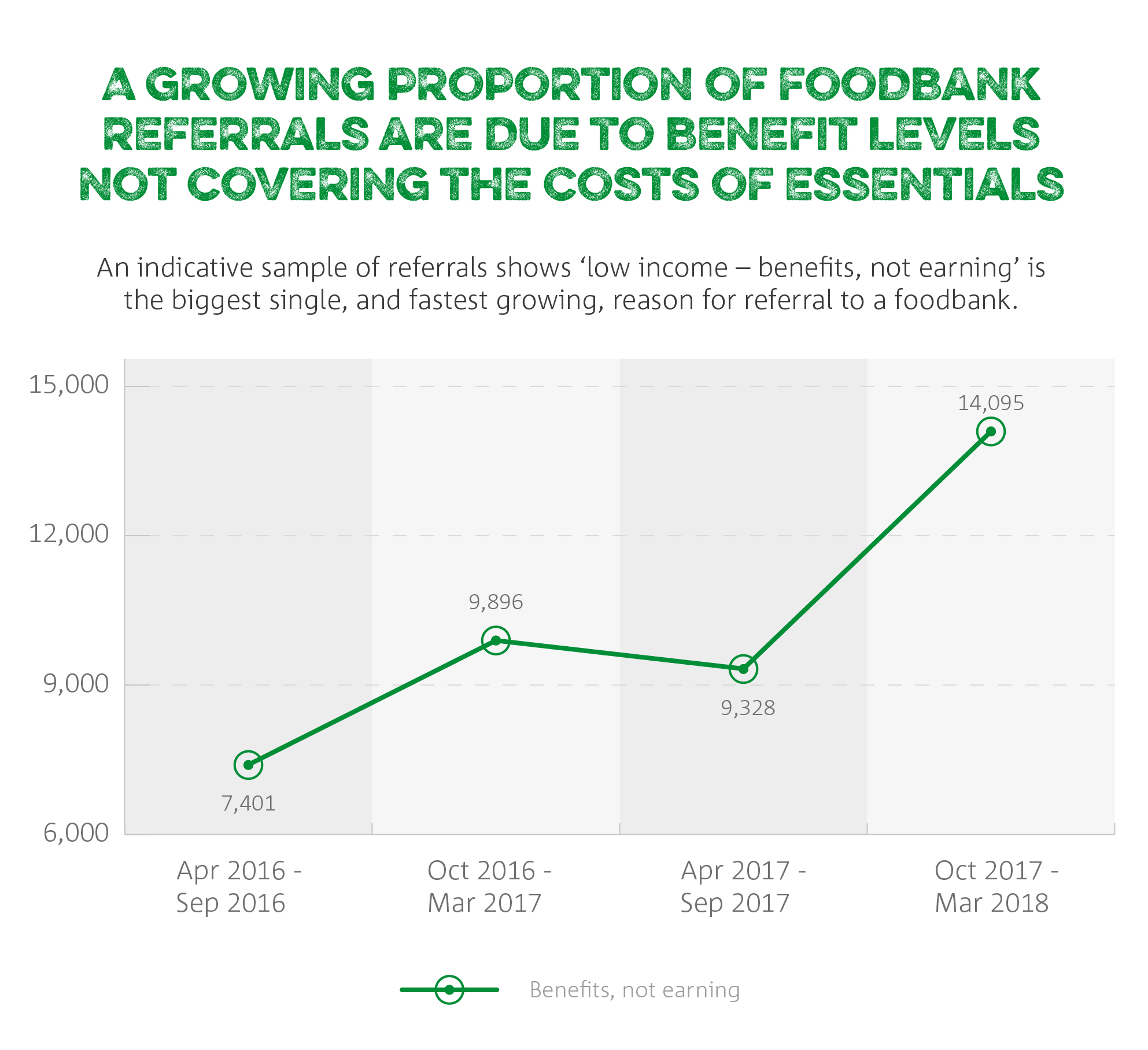News
“Benefit levels must keep pace with rising cost of essentials” urges The Trussell Trust as record increase in foodbank figures is revealed
24th April 2018
Share this: facebook link twitter link linkedin link
Between 1st April 2017 and 31st March 2018, The Trussell Trust’s foodbank network distributed 1,332,952 three day emergency food supplies to people in crisis, a 13% increase on the previous year. 484,026 of these went to children. This is a higher increase than the previous financial year, when foodbank use was up by 6.64%.

For the first time, new national data highlights the growing proportion of foodbank referrals due to benefit levels not covering the costs of essentials, driving the increase in foodbank use overall. ‘Low income – benefits, not earning’ is the biggest single, and fastest growing, reason for referral to a foodbank, with ‘low income’ accounting for 28% of referrals UK-wide compared to 26% in the previous year. Analysis of trends over time demonstrates it has significantly increased since April 2016, suggesting an urgent need to look at the adequacy of current benefit levels.**
Emma Revie, Chief Executive of The Trussell Trust, explains:
“As a nation we expect no one should be left hungry or destitute – illness, disability, family breakdown or the loss of a job could happen to any of us, and we owe it to each other to make sure sufficient financial support is in place when we need it most.
“It’s hard to break free from hunger if there isn’t enough money coming in to cover the rising cost of absolute essentials like food and housing. For too many people staying above water is a daily struggle. It’s completely unacceptable that anyone is forced to turn to a foodbank as a result.
“Universal Credit is the future of our benefits system. It’s vital we get it right, and ensure levels of payment keep pace with the rising cost of essentials, particularly for groups of people we know are already more likely to need a foodbank – disabled people, people dealing with an illness, families with children and single parents.”
Debt accounted for an increasing percentage of referrals – 9% up from 8% of referrals in the past year – and the statistics show the essential costs of housing and utility bills are increasingly driving foodbank referrals for this reason, with the proportion of referrals due to housing debt and utility bill debt increasing significantly since April 2016.
The other main primary referral reasons in 2017-18 were benefit delays (24%) and benefit changes (18%). New data about the types of benefit change driving foodbank use is clear: whilst referrals due to ‘benefit sanction’ have declined over the last year, those due to ‘reduction in benefit value’ have the fastest growth rate of all referrals made due to a benefit change, and those due to ‘moving to a different benefit’ have also grown significantly.
Universal Credit is not the only benefit people at foodbanks are experiencing issues with, but it is a significant factor in many areas. New analysis of foodbanks that have been in full UC rollout areas for a year or more shows that these projects experienced an average increase of 52% in the twelve months after the full rollout date in their area. Analysis of foodbanks either not in full UC areas, or only in full rollout areas for up to three months, showed an average increase of 13%.*
The release of the figures is accompanied by the publication of Left Behind: Is Universal Credit Truly Universal? , a new report into Universal Credit and foodbank use published today. The findings, from a survey of 284 people on UC referred to foodbanks, show the adverse impact of the initial wait, the lack of available statutory support, the inability of UC payments to cover the cost of living for people who most need it, and poor administration.
The charity is consequently calling for benefit levels to be uprated in line with inflation to ensure payments keep pace with the cost of living, particularly for disabled people and families with dependent children who are particularly at risk of needing a foodbank, and for a requirement to be placed upon Local Authorities to deliver a true Universal Support service to everyone who starts a Universal Credit claim. It is also asking for an urgent inquiry into poor administration within Universal Credit, so errors such as incorrect payments along with poor communication issues can be tackled.

